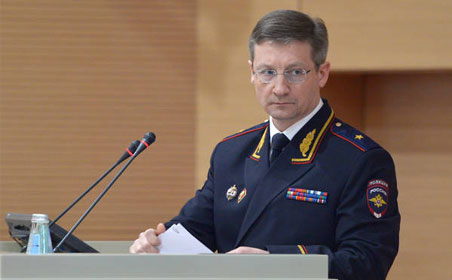
Police in Tatarstan Investigate Militant’s Statements
Publication: Eurasia Daily Monitor Volume: 11 Issue: 32
By:

On February 14, police in Tatarstan launched a criminal investigation into a video recording by the republic’s self-proclaimed insurgent leader, Emir Abdullah, who claimed responsibility for an attempted terrorist attack in the city of Nizhnekamsk last November (https://ntrtv.ru/index.php?newsid=19073).
A masked man claiming to be Emir Abdullah posted the video on December 1, 2013. In the video, the man asserted that he and his men had planted the improvised explosive devices (IED) in Nizhnekamsk and Tatarstan’s Alekseevsky district that were defused by the police on November 16. The leader of Tatar insurgents further claimed that they had attempted to fire missiles at the chemical plant in Nizhnekamsk on November 17, but that the attempt had failed. Last July, the insurgents claimed responsibility for the killing of Tatarstan’s deputy mufti, Valiula Yakupov, and the wounding of the republic’s mufti, Ildus Faizov. News of the alleged missile attack spread on the internet, but initially it was not officially verified (https://lenta.ru/news/2013/12/02/emir/).
The authorities later confirmed that there had been an attempt to attack the chemical plant with missiles. The authorities said that the same group of individuals was involved in earlier arson attacks on Christian Orthodox churches in Tatarstan and the attempted attack on the Nizhnekamsk chemical factory. Five people were arrested in connection with the attack—Rafael Zaripov, Stanislav Trofimchik, Airat Sitdikov, Almaz Galeev and Marat Sabirov. The suspects reportedly constructed five missiles, three of which flew for nearly a kilometer, but did not reach the chemical plant or even explode (https://ntrtv.ru/index.php?newsid=18739).
According to Tatarstan’s Interior Minister Artyom Khokhorin, the police detained 15 people in connection to the incidents. The official also sounded the alarm about the spread of militancy among Tatarstan’s young people. “Regretfully, the information about radical young residents of the republic participating in armed clashes on the side of the terrorist organizations in the North Caucasus, Afghanistan, Pakistan and Syria, has been confirmed,” Khokhorin told the parliament of Tatarstan on February 13. “According to our data, at least 100 people [from Tatarstan] are in such places now. About the same number of people fought in the past and have returned back to Russia. I do not need to explain what a ticking time bomb we have in these individuals.” The official said that six persons had been charged with participating in illegal armed formations and mercenary activities (https://www.regnum.ru/news/fd-volga/tatarstan/1766654.html).
The topic of Islamic radicalism in Tatarstan has been the subject of hot debates in the republic. Tatar activist Fauzia Bairamova, head of the Milli Mejlis of the Tatar People, made an emotional statement following the killing of deputy mufti Yakupov in July 2012. “We do not doubt that both Ildus Faizov and Venerulla (a.k.a. Valiula) Yakupov always worked hand in hand with the security services against the true Muslims,” she said. “One of them was killed because they did not need him anymore and they made an attempt on the life of the other in order to use it as a pretext for mopping-up operations against Muslims.” Bairamova said that the authorities had launched a massive campaign against the Muslims of Tatarstan, imprisoning hundreds of innocent people, and he called on the international community not to send their athletes to the World Student Games in Tatarstan in 2013 (https://golosislama.ru/news.php?id=10316).
In February, nearly two years after Bairamova’s statement, the authorities launched a criminal investigation into this incident, accusing her of inciting inter-ethnic strife as specified by Article 282 of the Russian Criminal Code. This article has been known in Russia as a convenient tool for the government to use in cracking down on dissidents. The 63-year-old Fauzia Bairamova had already received a conditional sentence for violating this article when the Tatar Milli Mejlis declared that it recognized Tatarstan’s sovereignty. Analyst Ruslan Aisin told the Nezavisimaya Gazeta newspaper that the authorities had resumed persecuting Bairamova after she announced the establishment of a Muslim Human Rights center that would defend Muslims who received prison sentences for extremism-related crimes (https://www.ng.ru/regions/2014-02-03/2_tatarstan.html).
Bairamova’s initiative may well have vexed the authorities because, as a rule, Islamist extremists in Russia are killed rather than arrested. Only Muslims who have little or nothing to do with the insurgency make it to prison. Therefore the government has questionable basis for the extremism sentences it has passed on many Muslims in the republic.
The efforts of Tatar activists to defend Tatarstan’s political autonomy find tacit support at the republican level, which allows these activists to survive over the long term, unlike in many other places in Russia. The Tatar elite’s craving for a greater degree of autonomy has resurfaced even now, at the height of the Putin regime, which is particularly harsh on those seeking regional autonomy. At a meeting dedicated to the 20th anniversary of the signing the agreement on the division of powers between Tatarstan and the Russian Federation, Vasily Likhachyov, a Russian State Duma deputy from the republic, said that the current policies of hands-on management that President Vladimir Putin and his team are implementing have outlived their usefulness. In Likhachyov’s words, these policies have produced disappointment among people and are good only for the security of the country, but not for its development (https://www.regnum.ru/news/fd-volga/tatarstan/1766879.html).
Official concern about the spread of militancy in Tatarstan, civil activists’ rejection of government policies and regional government officials’ muted disappointment with Putin together constitute a crisis of governance. These signs point to society’s weariness with the unending rule of Vladimir Putin, who increasingly drifts toward greater authoritarianism and oppression of ethnic minorities in the country.




